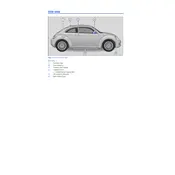Volkswagen Beetle 2014 Owner's Manual


The recommended oil type for the 2014 Volkswagen Beetle Coupe is SAE 5W-30 full synthetic oil. It's important to use the correct oil to ensure optimal performance and longevity of the engine.
To reset the TPMS in your 2014 Beetle, turn the ignition to the "On" position without starting the engine. Press and hold the TPMS reset button until the tire pressure light blinks three times, then release the button. Drive the car for a few minutes to allow the system to recalibrate.
If your Beetle's engine is overheating, safely pull over and turn off the engine. Allow it to cool down before checking the coolant level. If it's low, refill with a 50/50 mix of coolant and water. Do not open the radiator cap while the engine is hot. If the problem persists, consult a mechanic.
The timing belt on the 2014 Volkswagen Beetle should typically be replaced every 60,000 to 100,000 miles. However, it's best to check your owner's manual for the manufacturer's specific recommendation.
The check engine light can be triggered by various issues such as a loose gas cap, faulty oxygen sensor, or problems with the catalytic converter. It's advisable to use an OBD-II scanner to read the error code or take the vehicle to a professional mechanic for diagnosis.
The recommended tire pressure for the 2014 Volkswagen Beetle Coupe is typically 32 psi for both the front and rear tires. Always check your owner's manual or the sticker inside the driver’s door for the exact specifications.
To replace the battery in your 2014 Beetle's key fob, use a small flathead screwdriver to pry open the key fob case. Remove the old battery and insert a new CR2032 battery, ensuring the positive side is facing up. Reassemble the key fob.
Common causes of brake noise in a 2014 Beetle include worn brake pads, rotor issues, or debris caught between the rotor and pad. Regular inspection and maintenance can help prevent these issues. If noise persists, consult a mechanic.
To improve fuel efficiency, keep your tires properly inflated, adhere to regular maintenance schedules, avoid excessive idling, and drive at moderate speeds. Removing unnecessary weight from the vehicle can also help.
If the air conditioning is not blowing cold air, check the refrigerant level and look for leaks. Ensure the AC compressor is engaging. If these checks don’t resolve the issue, have the system inspected by a professional technician.